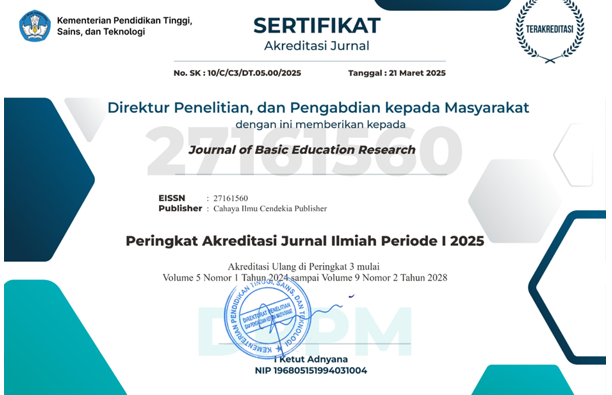The 360˚ View: Contextualized Virtual Reality Tours as Innovative Teaching Tool in Ecology for Elementary School Students
Abstract
Purpose of the Study. This study aims to develop and validate Contextualized Virtual Reality Tours as instructional materials for teaching ecology concepts to elementary students, focusing on enhancing students' conceptual understanding of ecological relationships and environmental awareness in a local context.
Methodology. The study employed a descriptive-developmental research design and used the ADDIE model to create Contextualized Virtual Reality Tours. Tools included a 64MP mobile camera for video production, AI-generated voice narration, and a 4-point Likert scale assessment for validation. Data analysis was performed with Microsoft Excel.
Main Findings. The Virtual Reality Tours significantly improved students' conceptual understanding, moving their performance from low to mastery level. Expert evaluations indicated high validity across content, instructional, and technical quality, and students rated the tours as highly acceptable and effective in increasing their engagement and comprehension of ecology concepts.
Novelty/Originality of this Study. This study introduces a localized, semi-immersive Virtual Reality Tour model for ecology education, making science concepts accessible to students without field trips. Integrating contextualized ecological elements addresses the gap in immersive science education tools for local environments, promoting relevant and cost-effective learning.
References
L. Valladares, "Scientific literacy and social transformation: Critical perspectives about science participation and emancipation," Science & Education, vol. 30, no. 3, pp. 557–587, 2021, doi:10.1007/s11191-021-00205-2.
K. M. E. Palines and R. A. O. D. Cruz, "Facilitating factors of scientific literacy skills development among junior high school students," LUMAT: International Journal on Math, Science and Technology Education, vol. 9, no. 1, pp. 546–569, 2021, doi:10.31129/LUMAT.9.1.1520.
T. Montebon, "K12 science program in the Philippines: Student perception on its implementation," International Journal of Education and Research, vol. 2, no. 12, pp. 153–164, 2014.
H. Tagupa, "What about the underperformers?," Inquirer.Net, 2021, https://opinion.inquirer.net/142116/what-about-the-underperformers
B. I. Bernardo, M. O. Cordel, M. O. Calleja, J. M. M. Teves, S. A. Yap, and U. C. Chua, "Profiling low-proficiency science students in the Philippines using machine learning," Humanities and Social Sciences Communications, vol. 10, no. 1, pp. 1-12, 2023. doi:10.1057/s41599-023-01705-y
N. Azizah, E. W. Nengsih, L. Wati, and L. R. Nastiti, "The perspective on monopoly as media in physics learning by using teams’ games tournament," Journal of Physics: Conference Series, vol. 1760, no. 1, p. 012015, 2021. doi:10.1088/1742-6596/1760/1/012015
L. Pinatil and A. Ramos, "Theory of adaptation of educators teaching technology-based courses," Recoletos Multidisciplinary Research Journal, vol. 11, no. 1, pp. 103-118, 2023. doi: 10.32871/rmrj2311.01.08
R. Abutayeh et al., "The use of virtual and augmented reality in science and math education in arab countries: a survey of previous research studies," Frontiers in Education, 2022.
S. Piovesan, L. Passerino, and A. Pereira, "Virtual reality as a tool in education," IADIS International Conference on Cognition and Exploratory Learning in Digital Age (CELDA), 2012. https://files.eric.ed.gov/fulltext/ED542830.pdf
C. Tsichouridis et al., "Virtual and augmented reality in science teaching and learning," Researchgate, 2019.
D. Checa and A. Bustillo, "A review of immersive virtual reality serious games to enhance learning and training," Springer, 2020. doi:10.1007/s11042-019-08348-9
M. Newman, B. Gatersleben, K. J. Wyles, and E. Ratcliffe, "The use of virtual reality in environmental experiences and the importance of realism," Journal of Environmental Psychology, vol. 79, p. 101733, 2022. doi:10.1016/j.jenvp.2021.101733
A. Alqahtani, L. Daghestani, and L. F. Ibrahim, "Environments and system types of virtual reality technology in STEM: A survey," International Journal of Advanced Computer Science and Applications, vol. 8, no. 6, pp. 77-89, 2017.
Z. Merchant, E. T. Goetz, L. Cifuentes, W. Keeney-Kennicutt, and T. J. Davis, "Effectiveness of virtual reality-based instruction on students’ learning outcomes in K-12 and higher education: A meta-analysis," Computers & Education, vol. 70, pp. 29–40, 2014.
Mossel and H. Kaufmann, "Wide area optical user tracking in unconstrained indoor environments," in Proceedings of the 23rd International Conference on Artificial Reality and Telexistence, 2013, pp. 108–115. doi:10.1109/ICAT.2013.6728915
S. Kavanagh, A. Luxton-Reilly, B. Wuensche, and B. Plimmer, "A systematic review of virtual reality in education," Themes in Science and Technology Education, vol. 10, no. 2, pp. 85-119, 2017.
N. L. Lasala Jr, "Validation of game-based activities in teaching grade 7-biology," Jurnal Pendidikan IPA Indonesia, vol. 11, no. 4, pp. 519–530, 2022.
J. T. D. Santos, R. Lim, and V. Danilo Jr, "Least mastered competencies in biology: Basis for instructional intervention," JPBI (Jurnal Pendidikan Biologi Indonesia), vol. 7, no. 3, pp. 208–221, 2021.
R. H. Westra, "Learning and teaching ecosystem behaviour in secondary education: Systems thinking and modelling in authentic practices," Utrecht University, 2008.
R. Westra, K. Boersma, A. J. Waarlo, and E. Savelsbergh, "Learning and teaching about ecosystems based on systems thinking and modelling in an authentic practice," in Contributions from Science Education Research, pp. 361–374, Springer Netherlands, 2007.
C. Christou, "Virtual reality in education," in Affective, Interactive and Cognitive Methods for E-learning Design: Creating an Optimal Education Experience, IGI Global, 2010, pp. 228-243.
R. Richey, "Developmental research: The definition and scope," ERIC, 1994. eric.ed.gov/?id=ED373753
N. J. Lasala, "EDUTainment: Effectiveness of game-based activities in teaching ecosystem topics," Recoletos Multidisciplinary Research Journal, vol. 11, no. 2, pp. 69–83, 2023. doi:10.32871/rmrj2311.02.07
Widiyatmoko and K. Shimizu, "An overview of conceptual understanding in science education curriculum in Indonesia," Journal of Physics: Conf. Series, vol. 983, pp. 1-6, 2018, doi:10.1088/1742-6596/983/1/012044.
Villegas, "Addressing the Philippine education crisis," Business World, 2021.
M. Situmorang, M. Sitorus, W. Hutabarat, and Z. Situmorang, "The development of innovative chemistry learning material for bilingual senior high school students in Indonesia," International Education Studies, vol. 8, no. 10, pp. 72-85, 2015.
Lumen Learning, "10 Benefits & uses for technology in the classroom," Lumen Learning, 2021.
J. M. P. Sanchez, "Development of science research culture in basic education: A theory generation," Recoletos Multidisciplinary Research Journal, vol. 10, no. 1, pp. 131-140, 2022, doi:10.32871/rmrj2210.01.10.
M. Llego, "How to contextualize curriculum for improved academic achievement," TeacherPH, 2021.
E. Dick, "Risks and challenges for inclusive and equitable immersive experiences," Information Technology and Innovation Foundation, 2021.
Mario, "Architectural VR/AR 3D rendering costs, rates & 3D modeling pricing for design firms," CAD Crowd, 2022.
H. Liu, Z. Wang, A. Mazumdar, and C. Mousas, "Virtual reality game-level layout design for natural environment constraints," Elsevier, vol. 4, no. 1, 2021, doi:10.1016/j.gvc.2021.200020.
L. Freina and M. Ott, "A literature review on immersive virtual reality in education: state of the art and perspectives," in The International Scientific Conference eLearning and Software for Education, vol. 1, no. 133, pp. 10-1007, Apr. 2015.
S. Mattoo, "Virtual reality: The promising future of immersive technology," G2, 2022. https://www.g2.com/articles/virtual-reality
K. W. Hariapsari, Tukiran, and E. Sudibyo, "Validity of teaching materials based on socio-scientific issues approach on the topic of vibration, waves, and sound," IOP Conf. Series: Journal of Physics: Conf. Series, vol. 1108, 012034, 2018, doi: 10.1088/1742-6596/1108/1/012034.
L. S. Nowell, J. M. Norris, D. E. White, and N. J. Moules, "Thematic analysis: Striving to meet the trustworthiness criteria," International Journal of Qualitative Methods, vol. 16, no. 1, 1609406917733847, 2017, doi: 10.1177/1609406917733847.
M. Giamellaro, "Primary contextualization of science learning through immersion in content-rich settings," International Journal of Science Education, vol. 36, no. 17, pp. 2848-2871, 2014.
S. J. Krause, C. Waters, W. J. Stuart, E. Judson, C. J. Ankeny, and B. B. Smith, "Effect of contextualization of content and concepts on students' course relevance and value in introductory materials classes," in 2016 ASEE Annual Conference & Exposition, Jun. 2016.
W. González-Espada, P. Llerandi-Román, Y. Fortis-Santiago, G. Guerrero-Medina, N. Ortiz-Vega, M. Feliú-Mójer, and D. Colón-Ramos, "Impact of culturally relevant contextualized activities on elementary and middle school students' perceptions of science: An exploratory study," International Journal of Science Education, Part B, vol. 5, no. 2, pp. 182-202, 2015.
D. Cook and R. Hatala, "Validation of educational assessments: A primer for simulation and beyond," Advances in Simulation, vol. 1, no. 31, 2016.
IQTEFL, "Age-appropriate content," 2019. https://www.iqtefl.com/post/age-appropriate-content
C. Schettini, "Writing in Bloom: Writing measurable learning objectives," Insider, 2019.
S. Rahmatsyah and K. Dwiningsih, "Contextualized Virtual Reality Tour (VRT) as instructional material in enhancing the understanding of biology concepts," Journal of Physics: Conference Series, vol. 1842, no. 1, 012027, 2021, doi: 10.1088/1742-6596/1842/1/012027.
G. Shabiralyani, K. Haza, N. Hamad, and N. Iqbal, "Impact of visual aids in enhancing the learning process case research: District Dera Ghazi Khan," Journal of Education and Practice, vol. 6, no. 19, 2015.
L. Martisiute, "Virtual reality (VR) in education: A complete guide," e-Student, 2020. https://e-student.org/virtual-reality-in-education/
M. S. Mandeep, C. Martin, and F. Jill, "Acceptability of healthcare interventions: An overview of reviews and development of a theoretical framework," BMC Health Services Research, vol. 17, no. 88, 2017.
Gardner, "Is code switching always a crisis in the classroom? How to successfully allow or avoid it," 2022. https://www.fluentu.com/blog/educator/code-switching-in-the-classroom/
N. K. A. Widayanti, I. G. Budasi, and D. P. Ramendra, “The implementation of differentiated instruction and its impact on student engagement in english class,” J. Pendidikan Bahasa Inggris Indonesia, vol. 12, no. 2, pp. 167–172, 2024.
N. Costa and M. Melotti, “Digital media in archaeological areas, virtual reality, authenticity and hyper-tourist gaze,” Sociology Mind, vol. 2, no. 1, pp. 53–60, 2012, doi: 10.4236/sm.2012.21007.
R. Lege and E. Bonner, “Virtual reality in education: The promise, progress, and challenge,” JALT CALL Journal, vol. 16, no. 3, pp. 167–180, 2020.
J. L. Núñez and M. C. Cuisia-Villanueva, “Overcoming the feeling isolation in distance learning: A collaborative auto-ethnographic research,” FDLA Journal, vol. 5, no. 1, p. 7, 2020.
Z. Li and Z. Qiu, “How does family background affect children’s educational achievement? Evidence from contemporary China,” J. Chinese Sociol., vol. 5, no. 1, pp. 1–21, 2018.
R. E. Mayer and R. Moreno, “Nine ways to reduce cognitive load in multimedia learning,” Educational Psychologist, vol. 38, no. 1, pp. 43–52, 2003.
N. L. Lasala Jr., “Students’ intrinsic motivation using game-based activities,” DLU Journal of Science, vol. 14, no. 2, pp. 50–70, Mar. 2024, doi: 10.37569/DalatUniversity.14.2.1161.
G. Makransky and G. B. Petersen, “The cognitive affective model of immersive learning (CAMIL): A theoretical research-based model of learning in immersive virtual reality,” Educational Psychology Review, vol. 33, no. 3, pp. 937–958, 2021.
L. Dawley and C. Dede, “Situated learning in virtual worlds and immersive simulations,” Handbook of research on educational communications and technology, pp. 723–734, 2014.
S. Park, J. Lee, and Y. Kim, “The effect of session duration on simulator sickness and performance during virtual reality immersive training,” PLoS One, vol. 14, no. 2, e0212799, 2019, doi: 10.1371/journal.pone.0212799.
Copyright (c) 2025 Rubert James Gestiada, Frank Joseph Tisoy, Nestor Jr Lasala

This work is licensed under a Creative Commons Attribution 4.0 International License.
Authors who publish with this journal agree to the following terms:
- Authors retain copyright and acknowledge that the Journal of Basic Education Research is the first publisher licensed under a Creative Commons Attribution 4.0 International License.
- Authors are able to enter into separate, additional contractual arrangements for the non-exclusive distribution of the journal's published version of the work (e.g., post it to an institutional repository or publish it in a book), with an acknowledgment of its initial publication in this journal.
- Authors are permitted and encouraged to post their work online (e.g., in institutional repositories or on their website) prior to and during the submission process, as it can lead to productive exchanges and earlier and greater citation of published work.





.png)


.png)
.png)


















